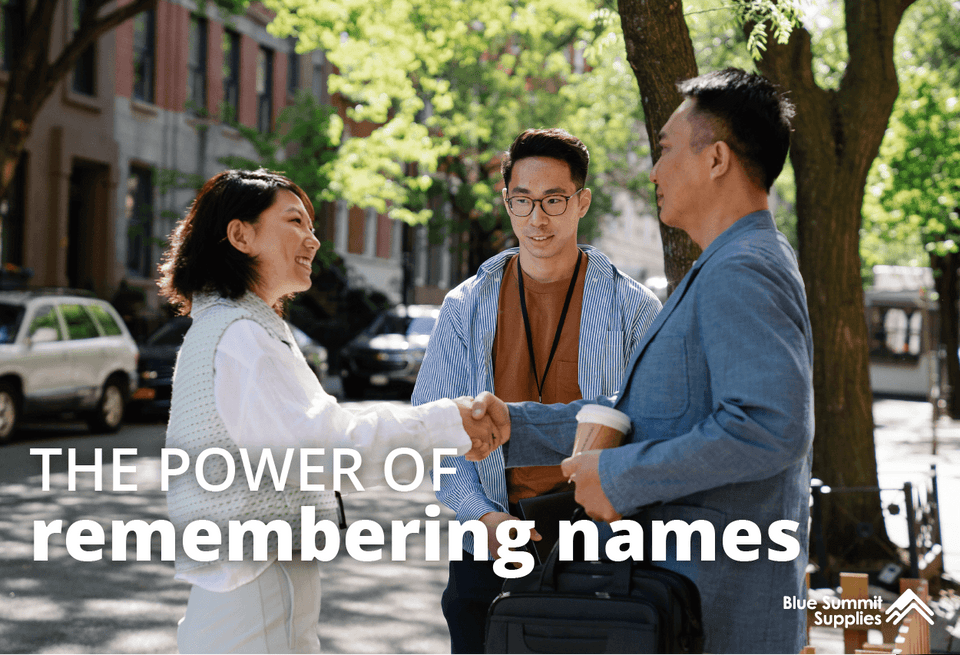Why are names important to people, and why do we enjoy hearing our own name so much? Humans are naturally drawn to their own name. We have a deep connection to it, and it makes us feel good to hear it. When we hear our name said by someone else, it makes us feel as though that person cares about us and like we share a greater connection. Making someone feel good and comfortable around you is certainly an asset in both your professional and personal lives.
In this article, we’re going to dig into the importance of calling someone by their name and why it’s such an effective networking and rapport building skill. We’ll also share strategies for how you can better remember people’s names, tackle challenging names, and connect names to faces.
Why Are Names Important?
Before we get into how to remember people's names, let’s discuss why names are important.
Our name represents our identity as well as our personal history, family background, and connection to our culture and community. It’s a part of who we are, and it’s an aspect of what makes us a unique individual. The power of names is deeply personal, which means hearing our own name can have a profound psychological effect.
Remembering someone’s name and repeating it back to them makes them feel important, valued, and seen. It also helps build a bond between the two of you and strengthens the relationship you have.
The next time you go to a networking event, large office event, or extended family reunion, greet people and take care to remember their names for the next time you cross paths. When you say their name aloud, they will instantly feel more at ease. Plus, they’ll feel respected and validated since you just proved to the other people around you that you know who they are.
They will appreciate that you took care to remember their name, which, in turn, will make them want to know more about you—they may even return the favor and put more effort into learning your name.
The benefits of remembering someone’s name can be applied to all aspects of your life, and this simple strategy will help you go far. You’ll be known for being thoughtful, a good listener, an easy person to talk to, and someone who cares about others—simply for remembering and utilizing people’s names.
Do you have difficulty remembering names? Whether you have a great memory or a terrible one, you can utilize these strategies to help you remember people's names and make the most of your connections.

How to Remember Names and Faces

1. Actively Listen
You can’t expect to retain anything anyone says if you’re not actively listening. There’s a big difference between actively and passively listening.
When you are passively listening, you might be taking in some of what the other person is saying, but your mind is wandering here and there, thinking about what you want to have for lunch or whether or not you chose the right shoes this morning. While listening passively, you might chime in every now and again with a generic “mmhm” or “uh-huh,” but you’re not actively trying to retain or gain new information.
When you actively listen to someone, you are fully engaged. You ensure your mind doesn’t wander and you do what you can to follow along, asking clarifying questions along the way to show your interest and to help you retain what the person is saying.
Have you ever had someone introduce themselves only to realize you didn’t actually listen to the name they said? That’s because you were passively listening. While they shared their name, you were thinking about your own introduction or whether or not you nailed that handshake.
When you are learning someone’s name, pay close attention. Actively listen and do your best to keep your mind from wandering elsewhere.
📚 Active vs. Passive Listening, Active Listening Activities, and Other Effective Ways to Listen

2. Repeat the Person’s Name Back
When you learn someone’s name, repeat it back to them. This has multiple advantages. Firstly, saying it out loud will help you remember it. When you say it a second time, you’re hearing it again, giving yourself a better chance of remembering it.
You’re also ensuring you caught the name correctly and are able to pronounce it properly right off the bat. This will save you from having to ask again later or worrying about whether or not it was Greg or Craig you just met.

3. Connect the Name to What You Know
To help you remember a name long term, connect it with something else you know about the person. The connection can be anything, so long as it’s distinguishable and, ideally, memorable.
You might connect a name with a facial feature, a particular style, a unique interest, a common interest you share, or a connection to where or how you met. To help yourself even more, try connecting what you know with a rhyme, shared letters, or a song.
For example,
Carol—Carol with the very curly hair.
Fred—Fred likes golf. GolF-Fred
Jesse—likes to travel, she’s probably seen the sea, Jes-sea
Helen—Helen was at the marketing conference last year. She was wearing a yellow shirt and the branding of the event was also yellow.
Bill—He is tall like the letter Ls in biLL
Hayley—like my cousin Hailey, but spelled differently.
Any connection you can make will help you retain the name along with the circumstances surrounding how you met that person. Just be sure not to fall into inappropriate stereotypes, and keep these (often playful) associations for your internal use only.

4. Don’t Be Afraid to Ask
If you are unsure, ask. It’s far better to ask than to find out later you were saying the wrong name or mispronouncing it. Be kind and polite. Simply ask, “can you repeat your name again?”
If it’s a name you really ought to know, you may be able to ask an acquaintance to jog your memory. Do you share a mutual friend or family member who knows the name? Can you look the person up on social media? Is there an office or client directory you can refer to?
If someone has a challenging name, apologize for not knowing for sure how to say it correctly and ask them if they’d mind teaching you.

5. Tackle Challenging Names Head On
Not all names are easy to say. Whether it’s an unconventional pronunciation of a common name, a long last name, or a name from a culture outside of your own, it’s okay to not know how to pronounce it correctly, but you do need to ask and learn.
If you come across a name you find difficult, take additional care in getting it right. Ask for clarification if you need to, practice saying it aloud, and do extra research on the correct pronunciation.
Whatever you do, don’t avoid someone’s name just because it is difficult to say. Remember how important our names are to our own identity and self-worth?
By avoiding someone’s name for fear of getting it wrong, you make that person feel less seen, heard, and valued. You may think you are doing the right thing because you don’t want to make a mistake, but that’s your own fear taking over. And if you are avoiding a name that you deem to be “foreign,” you’re engaging in microaggressions, which can do serious harm.
📚 Learn more: Combating Microaggressions at Work: Examples and Sensitivity Training Options

6. Track and Review Names on a Regular Basis
Practice, practice, practice. If you want to get better at remembering people's names, you need to put in the work. It takes more than hearing a name once and repeating it back.
After you learn someone’s name, repeat it in your head a few times, and when you have a private moment, jot that name down in a dedicated spot for keeping track of names. This could be a physical notebook, a notes app on your phone, or a specific app for remembering names (more on that below!)
Be specific. Include more than just a name. What does the person look like? How did you meet? Do they have any sort of unique style? What connections do you share? Our memories fade considerably over time, so any additional details you can record will help you match a name to a face later on.
Review your database of names from time to time to ensure you don’t forget who anyone is. Before you go to any repeat events, reunions, or larger office parties, look back on your list as a refresher. In private, practice saying each name aloud, paying extra attention to the more challenging ones.

7. Utilize Apps to Remember Names
Yes—there are remembering names apps that will help you keep track of your contacts. While a simple notes app will work too, apps designed to help you remember your contacts have additional features, such as search functionality, simple sorting, and a more dynamic layout.
Some common name remembering apps include:
More From Blue Summit Supplies
💡 How to Have Empathy at Work and Why It’s a Skill Worth Fostering
💡 Having a Bad Day at Work? Use Our 8 Strategies to Turn Your Day Around
We’re passionate about workplace happiness and wellbeing. Follow our office supplies blog for the latest trends, team building strategies, product comparisons, and more.
If you have any questions or want to talk to someone about office supplies, leave a comment, send us an email, or connect with us on Twitter, Facebook, or Instagram.
 For more informative articles about office supplies, subscribe to our email newsletter!
For more informative articles about office supplies, subscribe to our email newsletter!
Never fear, you won't begin receiving daily sales emails that belong in a spam folder. Instead, we promise a fun weekly roundup of our latest blog posts and great finds from across the web. And if you lose interest, it's always easy to unsubscribe with a single click.










